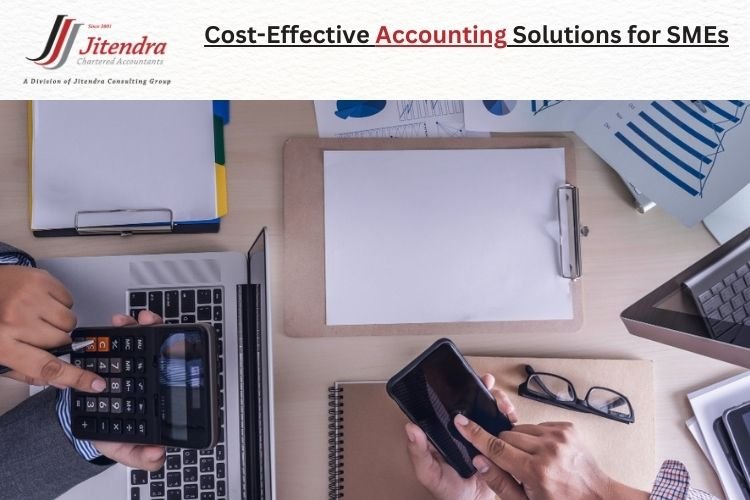
Cost-Effective Accounting Solutions for SMEs
One significant aspect of running small and medium enterprises is finance. Small budgets, a lack of expertise, and time constraints make updating account records and ensuring compliance challenging. This will only result in financial losses and even legal problems for SMEs. On the other hand, with the best strategies, SMEs’ accounting processes can be streamlined without overspending. This article delves into some effective accounting solutions designed for SMEs so business people can concentrate on expansion while ensuring financial wellness.
Jitendra Chartered Accountants are expert accountants who provide you with the necessary guidance on streamlining accounting procedures as well as provide effective accounting solutions through their services.
- Adopt Automated Accounting Systems
Automation is quite essential for small businesses engaged in managing financial efficiency. The application of automated accounting software can help one manage standard tasks like invoicing, tracking payments, and generating financial reports. Such systems tend to minimise errors, reducing the input of humans.
Automation will save time and give immediate insight into cash flows. Electronic invoicing, payment reminders, and automatic reconciliations make processes less complex, so your business runs smoothly.
For instance, for SMEs, investing in automated solutions is often less expensive than the cost of recruiting full-time accountants. It also equips businesses with the right decision-making framework by availing them of real, live financial information. And automation also helps generate online invoices instead of Excel and track all your expenses, receivables, and payables with the help of accountants like us doing accounting so you can access anytime in the online accounting platform.
- Cash Flow Management
Cash flow is the lifeblood of a business. Therefore, SMEs must be able to track cash inflows and outflows. This helps them identify areas of improvement. Proper management of cash flow will help ensure prompt payment to meet financial obligations such as payment of salaries and suppliers.
Implement recurring billing solutions. Systems in this respect ensure that payments become automatic, thus reducing incidents of overdue invoices and making financial stability possible. Any SME that actively tries to manage cash flows will not incur unnecessary expenses while maintaining operational efficiency.
- Streamline Accounting Practices
Overcomplicated accounting systems may drain resources and slow growth. SMEs thrive on simplicity. Getting rid of unnecessary steps such as purchase and sales orders would further save time, considering businesses have few authorization layers.
Another best practice separates personal from business expenses. Mixing these complicates record-keeping, and confusion may result in entry. Maintaining separate accounts ensures transparency, hence simplifying managing finances.
- Implement Timely Expense Management
All SMEs should have an effective system for tracking and reimbursing employee expenses. Recording expenditures accurately and payment without delay, improves the accuracy of financial books but also inspires employees.
Prompt payments also help improve relationships with suppliers and save money in early payment discounts.
- Be Mindful of Tax Liabilities
Handling tax filings until the last minute leaves opportunities open for errors, stress, and penalties. Maintaining a consistent flow of accurate records simplifies the tax preparation process and ensures timely submission.
Preparing earlier also makes it easier to manage VAT returns along with other regulations. Outsourcing tax management or using relevant tools can further reduce the burden on teams at home.
- Use Accounting Software
Modern accounting software becomes one cost-effective tool for managing the finances of SMEs as it automates complex tasks, enhances data accuracy, and simplifies compliance with IFRS.
Accounting software allows SMEs to prepare timely financial statements and manage spending, providing essential information for decision-making. This reduces reliance on manual procedures while meeting all regulatory compliance standards, especially where accounting experience is low.
- Outsource Accounting Services
Many SMEs would find outsourcing their accounting functions practical. It would provide the business owner with professional expertise without having to hire a full-time accountant on the payroll. Outsourcing firms do bookkeeping, tax preparation, and audits so that an owner can focus on growth.
However, the right partner is as important. They should be knowledgeable about your industry, should adhere to local regulatory guidelines, and aim to meet your business objectives. While outsourcing financial processes decreases overhead costs, its oversight must be maintained. You can consider JCA as your outsourcing partner.
- Engage Professionals Accountants
If outsourcing is not a possibility, employing an expert accountant might be just as useful. Skilled specialists can handle financial records and taxes and offer strategic recommendations. For SMEs, this investment frequently pays off by avoiding costly mistakes and increasing long-term financial health.
When hiring, seek people who understand industry-specific rules and have familiarity with accounting software. An excellent accountant, whether full-time or part-time, may improve your business’s finances. Find the best accountants at JCA.
Why Choose Jitendra Chartered Accountants?
Accounting is critical to the success of small and medium enterprises. Small firms may keep their finances in order through automation, process simplification, and cash flow management. However, outsourcing and employing specialists from JCA can provide more flexibility and knowledge while minimising noncompliance and financial risk. Following these tactics will allow SMEs to optimise their accounting processes, save money, and focus on the essentials.


